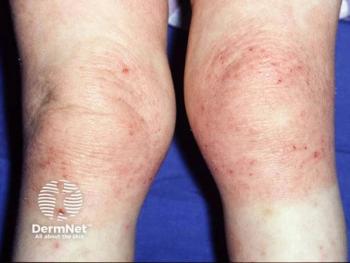
Tralokinumab with TCS Effective in Patients with Severe Atopic Dermatitis
Investigators noted the treatment method was well tolerated in patients who could not safely use oral cyclosporine.
A new study from Germany suggested that the monoclonal antibody tralokinumab 300 mg, when paired with additional topical corticosteroids, was well tolerated in patients with severe
Investigators led by Stephan Weidinger, MD, PhD, University Hospital Schleswig-Holstein, Kiel, noted that patients who struggle with severe atopic dermatitis often have limited treatment options.
Though CSA is commonly used, treatment could result in potentially serious adverse events.
Utilizing data from a phase 3 trial on tralokinumab, investigators used the present study to evaluate the efficacy of the medication along with topical corticosteroids in adult patients with severe atopic dermatitis.
The Methods
The study was comprised of a 26-week, multi-center, parallel, randomized, double-blind, placebo-controlled, phase 3 trial which enrolled adult European patients with the atopic disease.
In total, 277 adult patients with severe atopic dermatitis were enrolled in the study. From there, participants were randomized 1:1 to subcutaneous tralokinumab 300mg or placebo every 2 weeks with topical corticosteroids being issued when needed.
Prior to this, patients entered a screening period of 2-6 weeks, which included a washout of prior medications.
All patients were instructed to apply a thin layer of topical corticosteroids once daily as needed in areas where active lesions were present.
After completion of the week 26 visit, eligible patients were able to enter a long-term extension trial (ECZTEND). Those who were not transferred to the trial completed a 14-week off-treatment follow-up for safety, pharmacokinetic, and anti-drug antibodies.
The primary endpoint was a 75% improvement in eczema Area and Severity Index (EASI-75) at week 16 of the study, while the secondary endpoints were reduction of worst daily pruritis NRS of ≥4 from baseline, change from baseline in SCORing Atopic Dermatitis (SCORAD) score and Dermatology Life Quality Index (DLQI) scores (both at Weeks 16 and 26), and EASI-75 at Week 26.
The Findings
Of the total amount of patients in the study, 207 (74.7%) were previously exposed to CSA for treatment of atopic dermatitis prior to the study, with inadequate efficacy (34.3%) and side effects (31%) having been reported.
Investigators reported that at Week 16, the proportion of patients achieving EASI-75 was significantly higher in the tralokinumab plus topical corticosteroids group compared to the placebo plus topical corticosteroids group (64.2% vs 50.5%; difference [95% confidence interval] 14.1% [2.5-25.7]; P=0.018).
Additionally, a greater proportion of patients achieved a reduction in worst daily pruritus NRS (weekly average) of ≥4 from baseline to Week 16 with tralokinumab plus topical corticosteroids versus placebo plus topical corticosteroids (45.5% vs 35.6%).
However, this did not reach statistical significance (9.7 [–2.0 to 21.4]; P=0.106), and subsequent secondary endpoints were interpreted nominally.
Regarding DLQI, adjusted mean change was greater for patients in the tralokinumab group at week 16 (–11.2 vs –9.6; –1.5 [–2.6 to –0.4]; P=0.009), as were changes in eczema-related sleep.
The overall frequency of adverse events between weeks 0 and 26 were comparable between the 2 treatment groups, and the efficacy of tralokinumab with topical corticosteroids in patients who had previously failed CSA treatment was consistent with the overall trial population.
“Additionally, a post hoc subgroup analysis indicates that dupilumab-experienced patients can benefit from tralokinumab plus TCS as needed,” the team wrote.
The study
This article was initially published by our sister publication
Newsletter
Like what you’re reading? Subscribe to Dermatology Times for weekly updates on therapies, innovations, and real-world practice tips.











